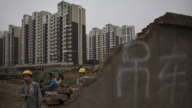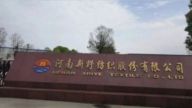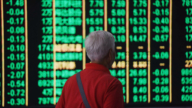【新唐人2013年06月17日讯】中共审计署公布了36个地方政府的债务余额,超过3.8万亿元,美国信用评级公司——“穆迪公司”推算,从2010年末至2012年末,两年内,中国地方政府的债务可能已经上升到12万1千亿。然而,目前各级地方政府还在积极上马大型项目,而地方政府的财政收入主要来源于卖地,随着卖地机会越来越少,这些不断增长的债务怎样偿还?为什么银行还在不断给它贷款?中共中央政府摸清地方政府的惊人债务后,有无勇气让地方政府倒闭?中国经济面临什么后果,我们一起来听听专家的分析。
美国著名的三大信用评级公司之一——“穆迪公司”日前表示,根据中共审计署公布的数字推算,从2010年末至2012年末,中国地方政府直接和担保债务可能已经上升了13%,达到12万1千亿。
另据美国《华尔街日报》报导,中国各级地方政府还在积极上马大型项目。到目前为止,共有16个省和2个直辖市政府发布了公告,宣称投资项目对于推动经济增长的重要性,并敦促下级政府尽一切可能加速推进未来几个月的资本项目。这些省市的经济规模大约占到中国国内生产总值(GDP)的60%以上。
美国南卡罗莱纳大学艾肯商学院教授谢田: “这些东西跟它的腐败,跟它的一些滥权都是连在一起的,它也没办法真正去遏制,如果真正遏制的话,下面说,那我都不建了,我们GDP一下倒退,上面可能也受不了,现在处于一种利益集团上下互相勾结,也互相箝制,互相对立、对峙这么一个状态。”
从债务资金来源看,36个地方本级政府2012年底债务余额中,银行贷款和发行债券分别占78.07%和12.06%。
谢田:“中国的司法不独立,银行也不独立,中央银行也不独立,地方官员有权利、有能力去控制各地的银行,他依赖银行贷款,对于银行来说,如果不让它贷款,他们也没有地方去赚来他的利润。”
谢田还指出,很多的贷款与前期的房地产投资有关,如果不再继续贷款给当地政府,以前的投资就会泡汤。
审计署财政审计司负责人答记者问时,说审计的目地是要“摸清地方政府性债务增长变化情况,揭示债务管理中出现的新情况、新问题和风险隐患。”
而中国的烂尾工程、半瘫子工程、重复建设,金融体系已经几近拖垮中国经济,谢田曾指出,中国地方政府破产或有助于改善中国经济,不过中共不会允许地方政府破产。
谢田:“中共处于维稳和维持政权、维护所谓局势的角度出发,它不会允许这些项目破产,也不会允许银行破产,它没办法只好继续追加投资,继续拨款,继续印钞票,他也知道继续印钞票的结果,最后导致通货膨胀不可收拾,民怨沸腾的话中共也会垮台,那毕竟可能是以后的(事),对他来说度过眼前的难关才是最重要的。”
不过,北京《国情内参》期刊的首席研究员巩胜利认为,中共7级的政府构架中,还有大量的隐形经济和债务没有暴露出来。
北京《国情内参》首席研究员巩胜利:“公布的这个数据有没有水分,这个很值得疑问的,在中国政府之上有一个中国共产党,共产党的财政预算从来都没有公开过,这一部分隐形的债务不知道有多大,审计署还没有权利审计党的机构,如果书记市长腐败突然爆发,中国债务真的控制得了?所以我提醒媒介,关注这个比它的表面数字更有意义。”
谢田表示,中共的高层已经意识到巨大的地方债务,而企图收紧银根,但是地方政府只考虑自己在位时的业绩,和从新的项目中捞取好处。因此显示出﹕中共高层对中国经济的不可控制性。
采访/林莉 编辑/刘惠 后制/李智远
12-Trillion-Yuan Local Debts: Chinaj’s Economy Out Of Control
China’s National Audit Office (NAO) data shows that 36 local
governments’ debts have reached over 3.85 trillion yuan.
Leading US credit rating agency, Moody’s, warns that
by the end of 2012,
China’s local government debts might have
increased to 12.1 trillion yuan.
However, local Chinese Communist Party authorities
are still boosting large-scale construction projects locally.
It is known that land sales have been
a major part of local fiscal revenues.
As land-sale opportunities shrink, how will these
increasing debts be paid off in the future?
Why have bank loans continued with these local projects?
Is it possible that the CCP central authorities will allow
local authorities to go bankrupt?
What’s the economic aftermath facing China in
the near future? Let’s see what experts are saying.
Moody’s recently said that based on the NAO report data,
from the end of 2010 to the end of 2012,
China’s local government debts may have risen
by 13%, up to 12.1 trillion yuan.
The Wall Street Journal reported that large-scale
investment projects are still locally promoted.
So far, 16 provincial-level authorities have declared
“the importance of investment projects in driving growth".
They have urged “lower levels of government to
accelerate implementation of plans in the months ahead."
Reportedly, these provinces and municipalities represent
over 60% of China’s GDP.
(Prof. Univ. of South Carolina-Aiken) Xie Tian:
“These debts are linked to CCP officialdom’s corruption and power abuse.
The CCP has no way to truly curb it.
If it really intends to prevent it, all its local authorities would
react by ceasing activity that allows corruption to continue.
The result would be big setback in GDP,
That is something that CCP central could not bear.
Currently, inside the CCP, there exist collusion, and
stand – offs between top-level and local interest groups."
By the end of 2012, among the debt balances of
the 36 local authorities, bank loans were over 78%,
and bond issuance was over 12%.
Xie Tian: “China has no independent judiciary, nor
has it any independent banks, only its own central bank.
Local CCP leaders have authority to control local banks,
so they rely on bank loans.
The banks won’t reject local governments, for they have
no other sources for earning more profits."
Xie Tian points out that a great many bank loans
were invested in real estate in the past.
To stop bank loans to local governments would
be to risk previous investment for naught.
In replying to a reporter, a Public Finance Audit chief has
said that the audit goal is to “find out how
local governments’ debts have increased.”
Also, the audit serves to “reveal the new situation, new
problems, and potential risks in terms of debt management."
So far, China’s financial system has been seriously
affected by unfinished construction projects,
and redundant constructions.
Xie Tia says that local government bankruptcy may
help to improve China’s economy.
However, CCP authorities won’t allow this to
happen in practice, says Xie.
Xie Tian: “In order to keep its political rule, the CCP
won’t allow its local authorities and banks to go bankrupt.
It has no other options but to allocate more funds,
and to print more money.
The CCP knows well that printing more money
will make inflation run out of control.
It also knows that seething public discontent will
cause the CCP’s collapse, but it’ll happen later on anyway.
The CCP’s most important issue is how to get through
despite difficulties at the moment."
Gong Shengli, a think-tank senior researcher in Beijing,
believes that a massive invisible economy and rising
local debts in China remain unexposed.
Gong Shengli: “The released figure is questionable.
In China, the CCP overrides the government.
The CCP’s financial budget has never been made public.
We don’t know how much this is part of invisible debts.
The NAO has no authority yet to
audit the Party’s organizations.
With the exposures of the corruption of Party chiefs
and mayors, will those local debts still remain controllable?
So I’d like to remind the media that paying attention to
these facts makes more sense than accepting official figures."
Xie Tian says that the CCP central authority has realized
the existence of a huge burden of local debts.
Thus it has tried to tighten the money supply.
Whilst local authorities only consider their own performance,
which is proved by the state of local economies.
Also, local leaders and officials only focus on their own
personal gains, pocketed from new investment projects.
Xie Tian concludes that the CCP central authorities
have lost control of China’s economy.






























